-
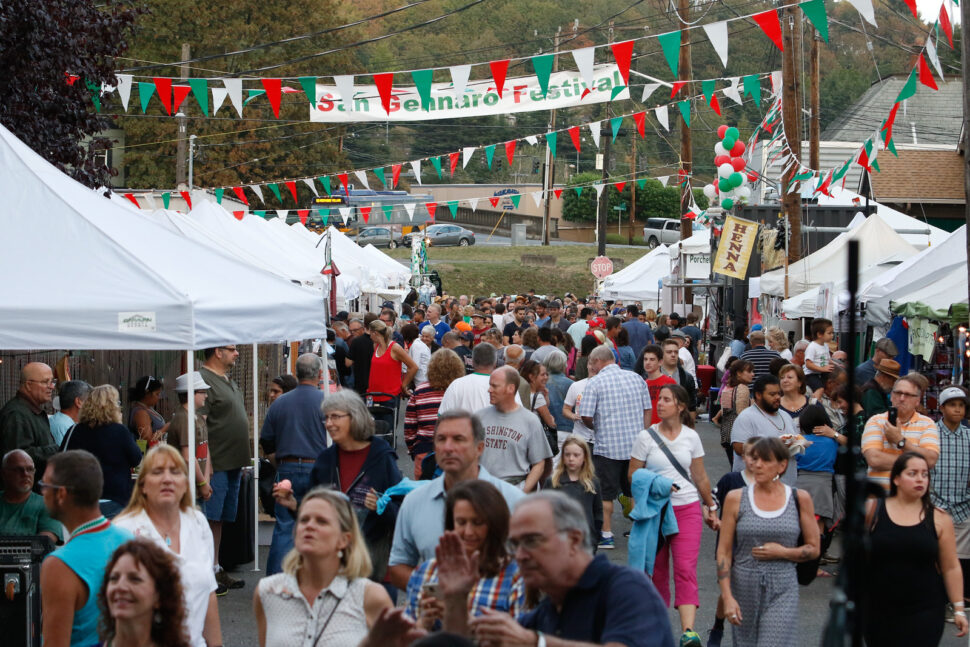
Support Recovery Beyond at the San Gennaro Festival
Are you planning to attend the San Gennaro Festival? If you are, stop by the booth “Ursino Cugini Pizzelles” or the wine garden and enjoy a great Italian cookie favorite – the Pizzelle! Cookie sales support Recovery Beyond and of course, donations are welcome.
Here are the details
San Gennaro Festival
September 7th through 9th1225 S. Angelo Street
Seattle, WA 98108Hours:
Friday from 6:00 pm – 10:00 pm
Saturday from 10:00 am – 10:00 pm
Sunday from 10:00 am – 4:00 pmThanks for your support.
0 -
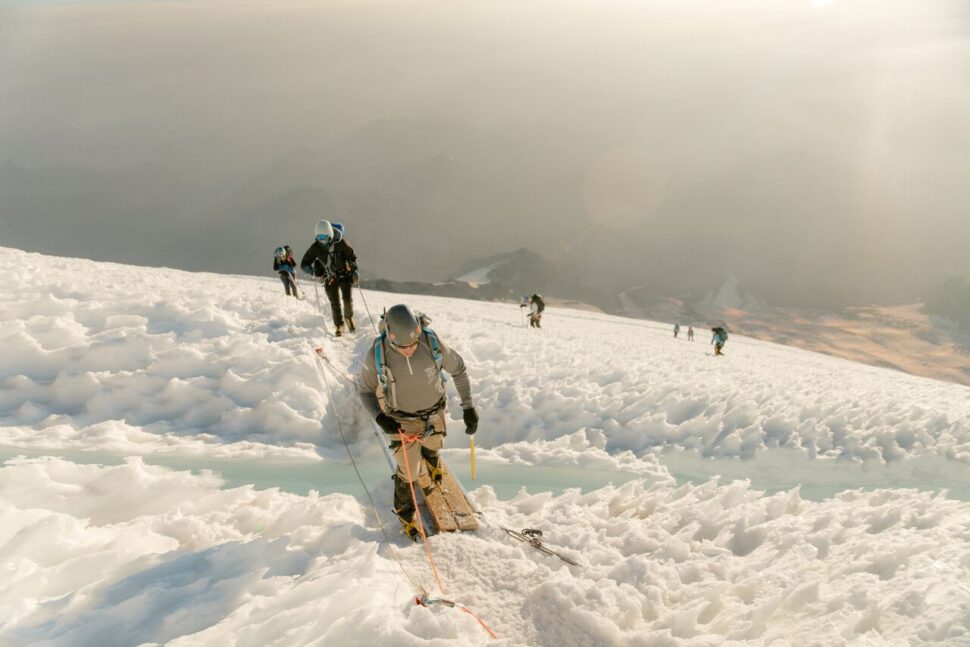
Reaching The Summit – 2018
This past week the second of two teams reached the summit of Mt. Ranier bringing to a close another successful year of climbs for Recovery Beyond and the Climbing Out program. The energy and effort that was put into this program as a team (donors, volunteers, climbers, staff, and others who supported our efforts), is most reflected in this capstone climb. Thank you for your involvement and congrats to our collective success.
Watching someone in our climb program move from being disconnected from community and struggling with a low-view of themselves, to standing on top of the highest peak in Washington, connected and beaming with confidence, is why we do this work. Sarah Farrens, a 2018 recovery climber, shared this sentiment and her experience at Camp Muir this past week.
Without the commitment and dedication of the entire team, what we accomplished could not have been possible. The board, the staff, the donors, the many volunteers, and the miraculous dedication of our recovery climbers, together allows for this collective success. So again, thank you!
We had 100{637c4c527fde39f83a380e19107d2ba88ad72607f37ccf8f8b7edeff1c20688c} summits for recovery climbers, all injury free, and a monumental achievement in our climbers lives, the community, and this program’s history. Here are a few more details surrounding our capstone climb.
2018 Rainier Climb Stats:
- 8 recovery climbers summited Mt. Rainier (4 women, 4 men) – all indicated when asked that this was a top accomplishment in their life
- 23 total RBP climbers (including guides) to the summit
- 45 volunteers helped with guiding, basecamp support, portering, celebration picnics, trip briefings and more
Take a look at these stunning photos showcasing this year’s climb.
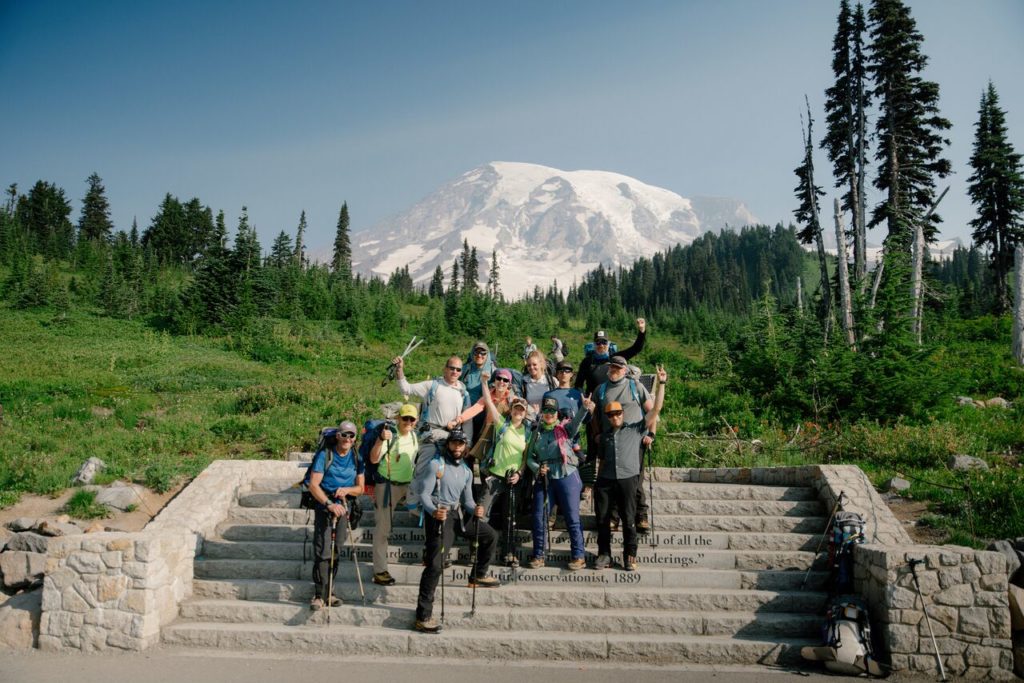
Tacoma Team on the Paradise Steps before their hike to Camp Muir, Paradise, WA
photo courtesy: Greg Balkin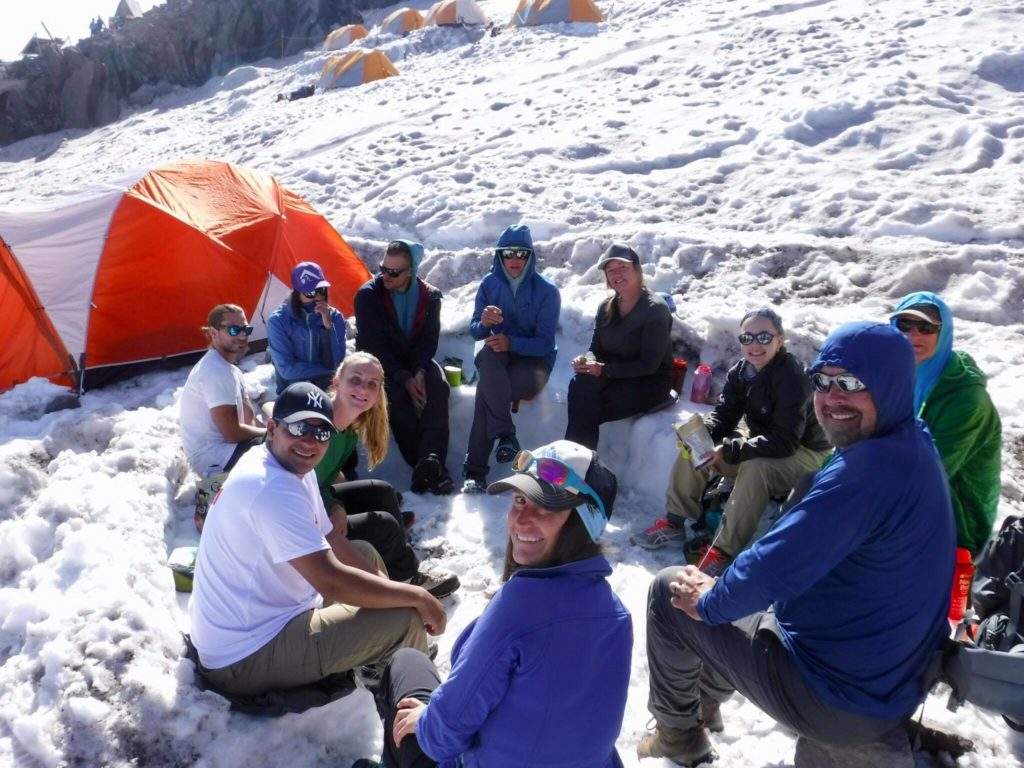
Seattle Team having dinner at Camp Muir
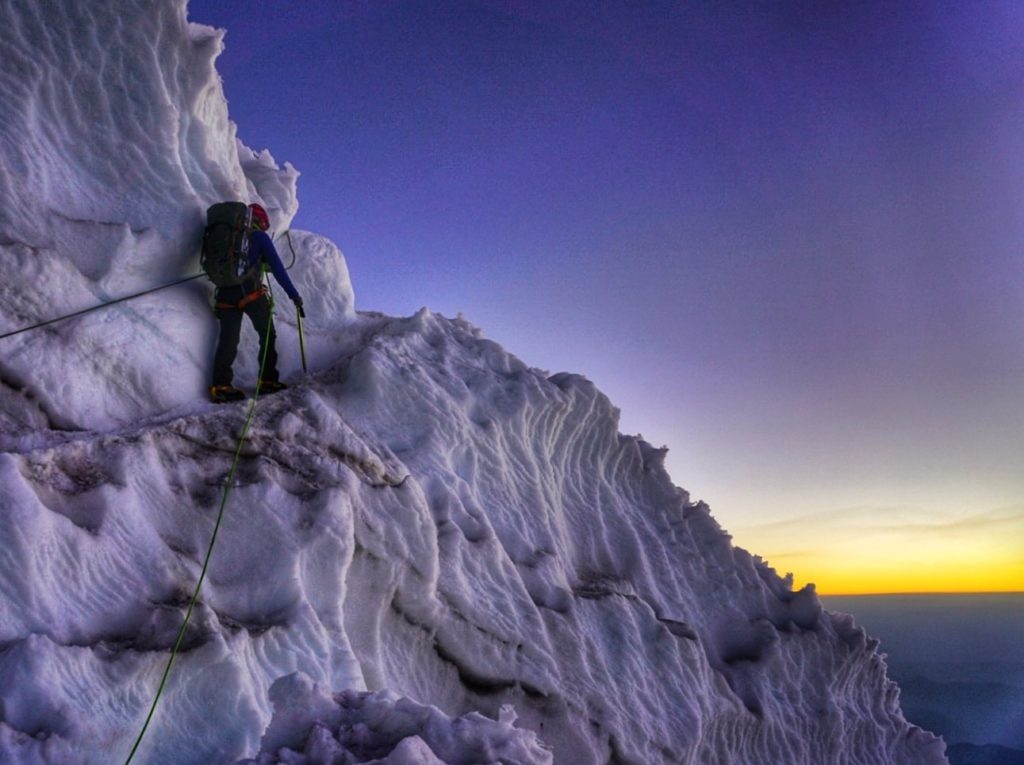
McKenzie Johnson Crossing onto the Emmons Shoulder at Dawn
photo courtesy: John Colver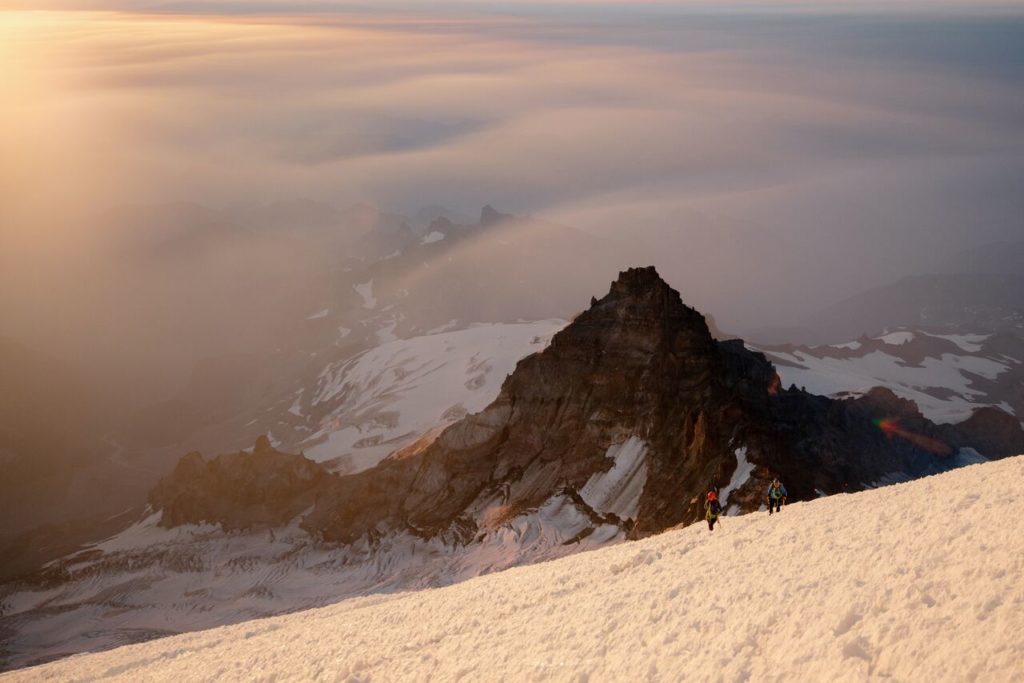
Little Tahoma, Near High Break, Emmons Glacier – 13,500′
photo courtesy: Greg Balkin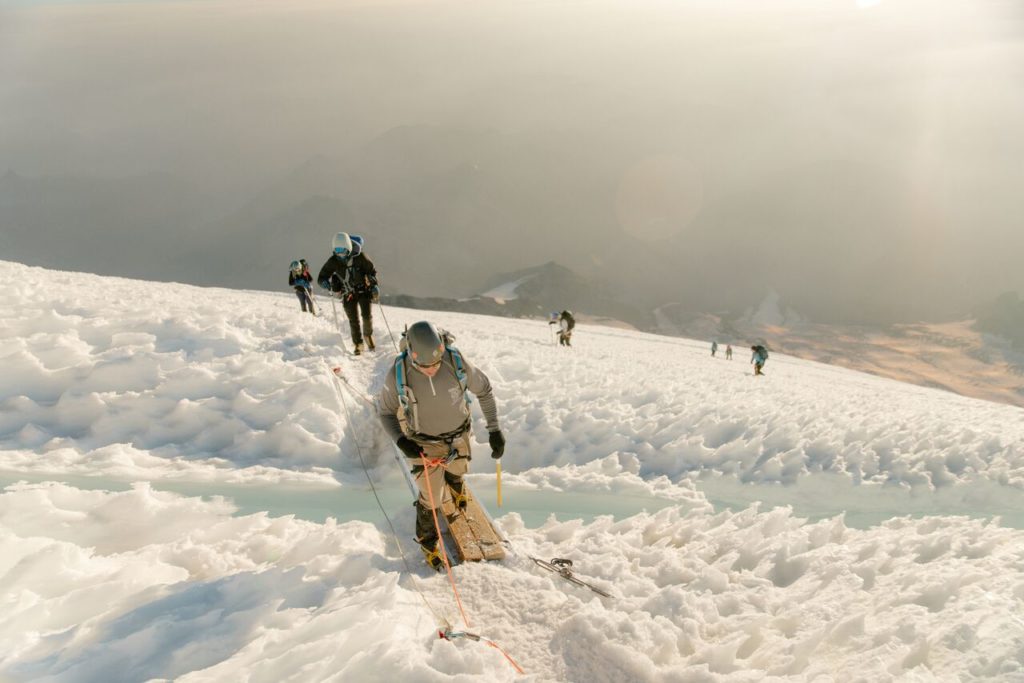
Ladder Crossing, Near High Break, Emmons Glacier, 13,500ft
photo courtesy: Greg Balkin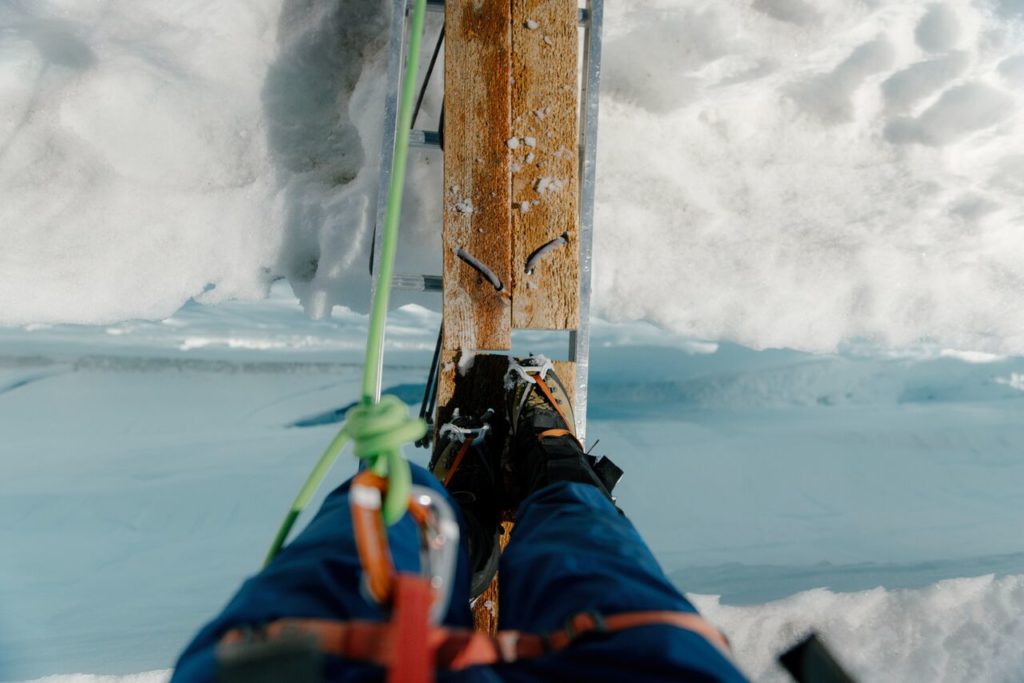
Peering into a Crevasse, the Emmons Shoulder, near 13,200′
photo courtesy: Greg Balkin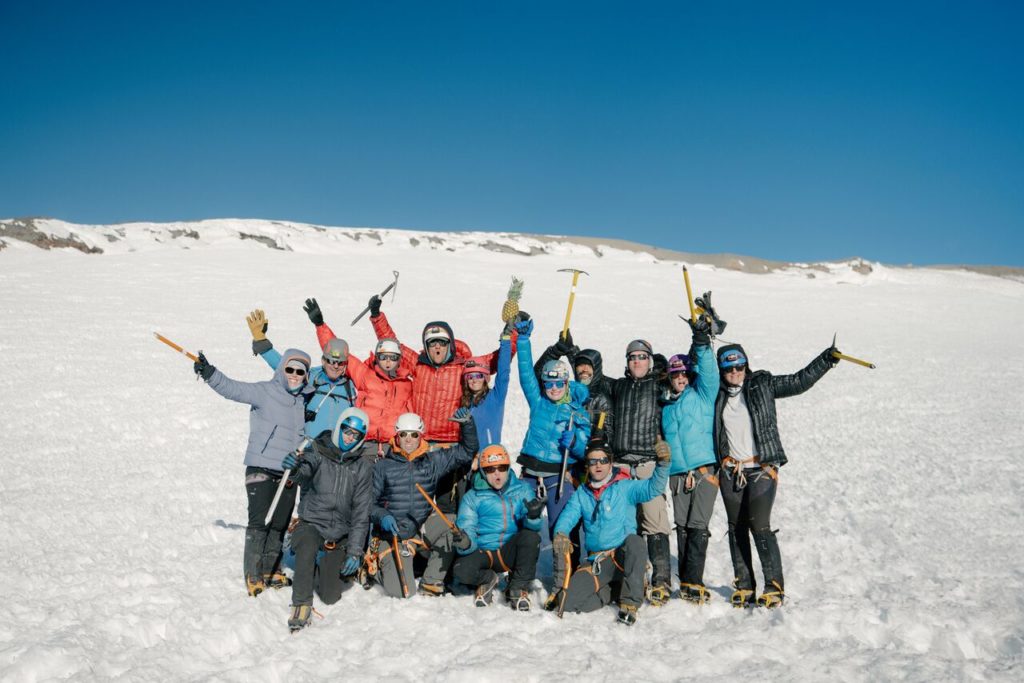
TACOMA SUMMIT PHOTO 2018
photo courtesy: Greg Balkin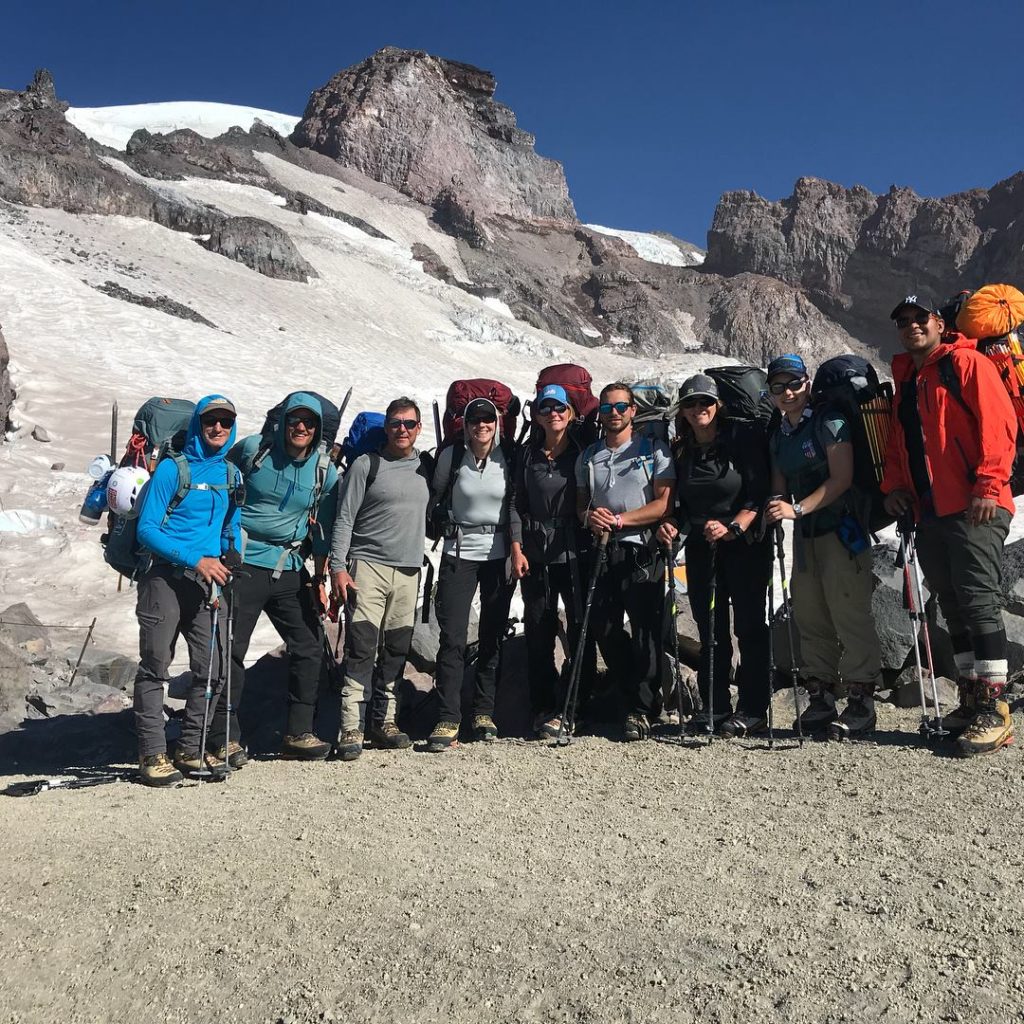
Seattle Team Packed Up, Leaving Camp Muir
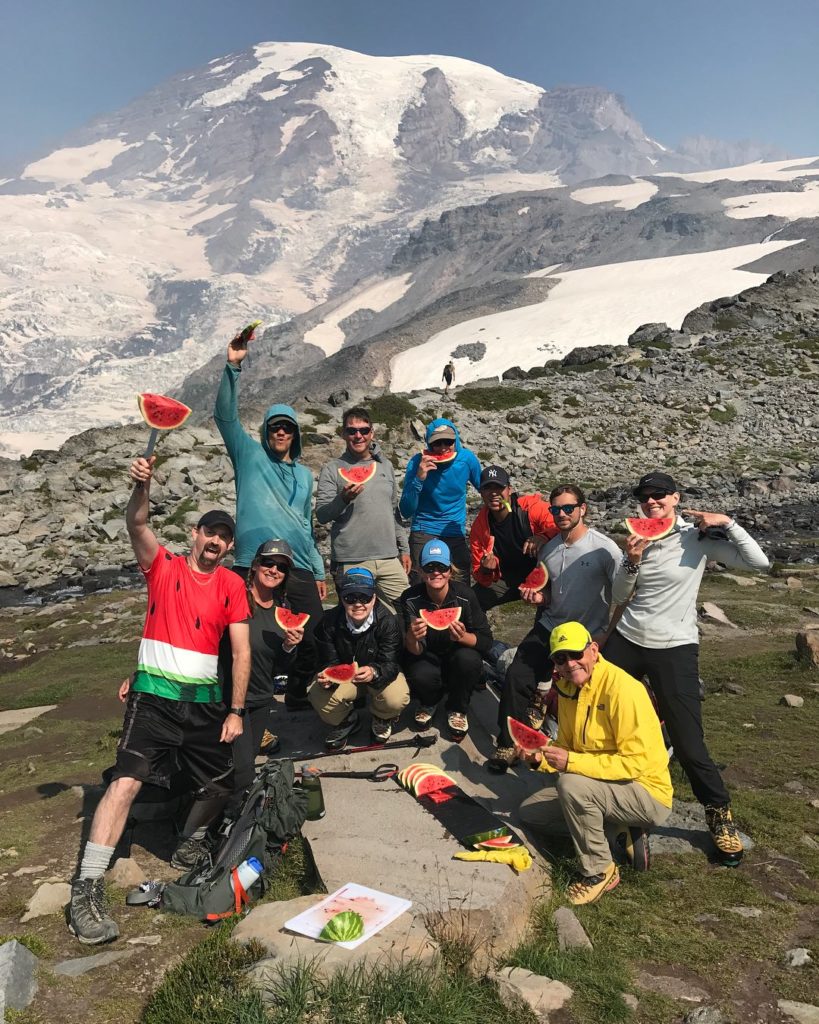
Watermelon Tradition! – Watermelon Break at Pebble Creek before final decent to Paradise.
photo courtesy: Scott Brown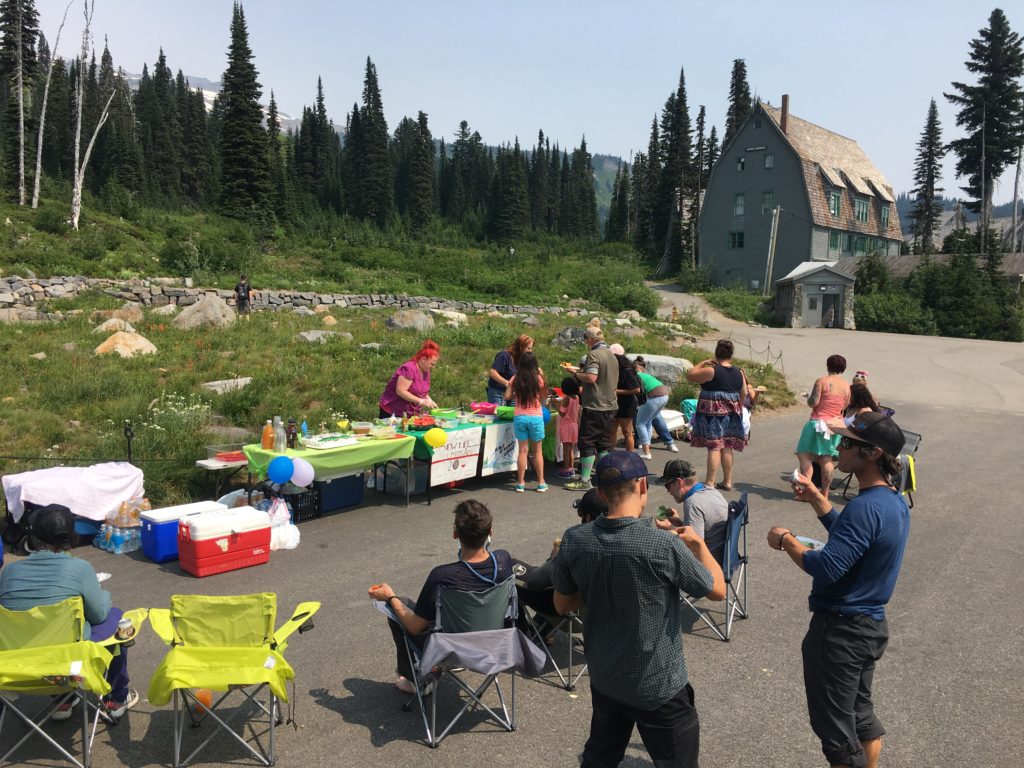
Tacoma Team Picnic at Paradise, WA
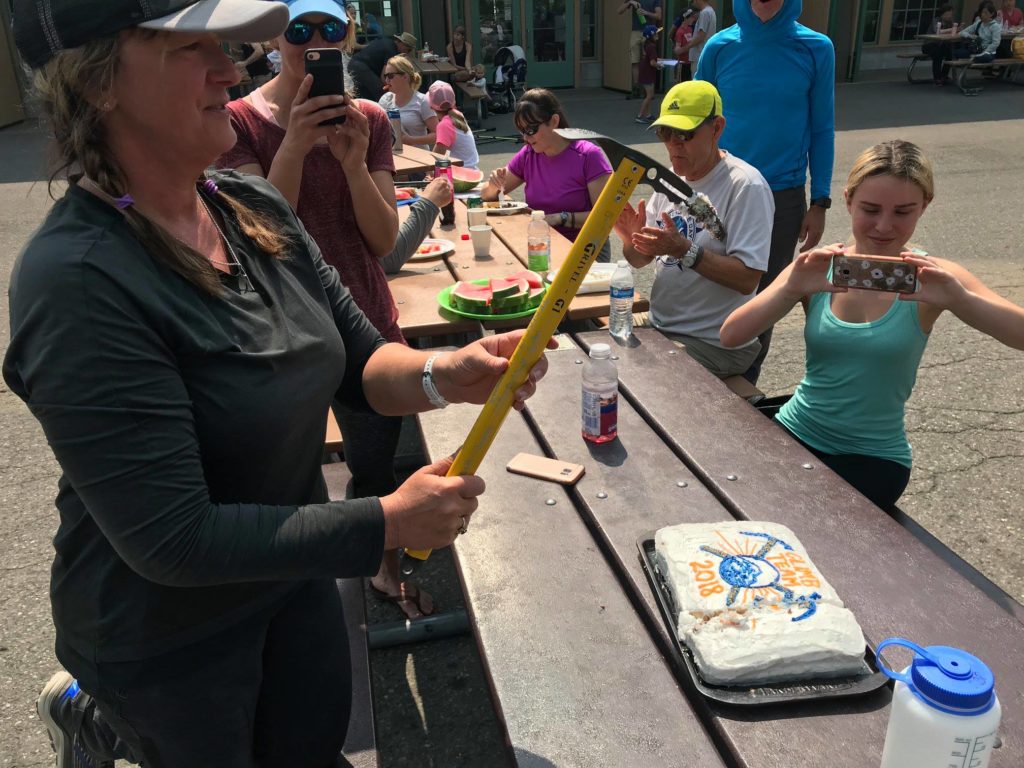
Seattle Team Picnic at Paradise, WA, our tradition of cutting the “mountain cake” with the ice axe!
-
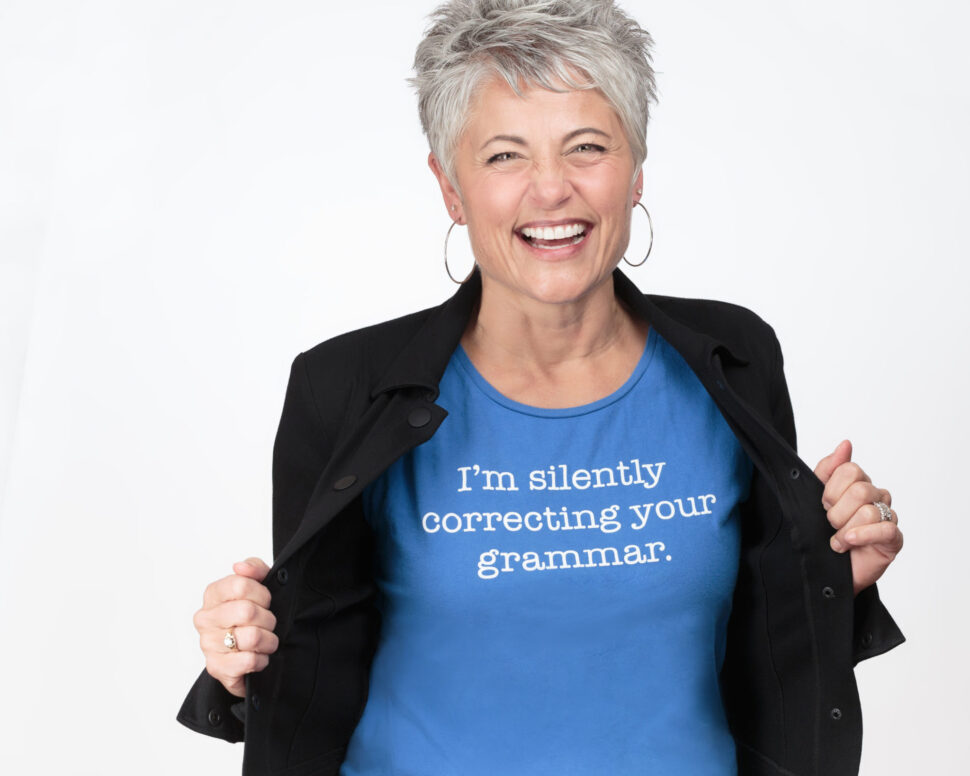
Save the Date! Support our program by joining us for our Seminar
Our Climbing Out Program teaches our participants interpersonal skills and the value of building healthy relationships. We are very excited to extend similar ideas out into our community by announcing our first seminar series, Effective Communication: Tips for Speaking Intentionally, presented by Jenni Butz. Jenni is a former foreign language teacher, who presents lectures and workshops on communication throughout the United States and Europe. Jenni believes that “when we learn, everybody wins.”
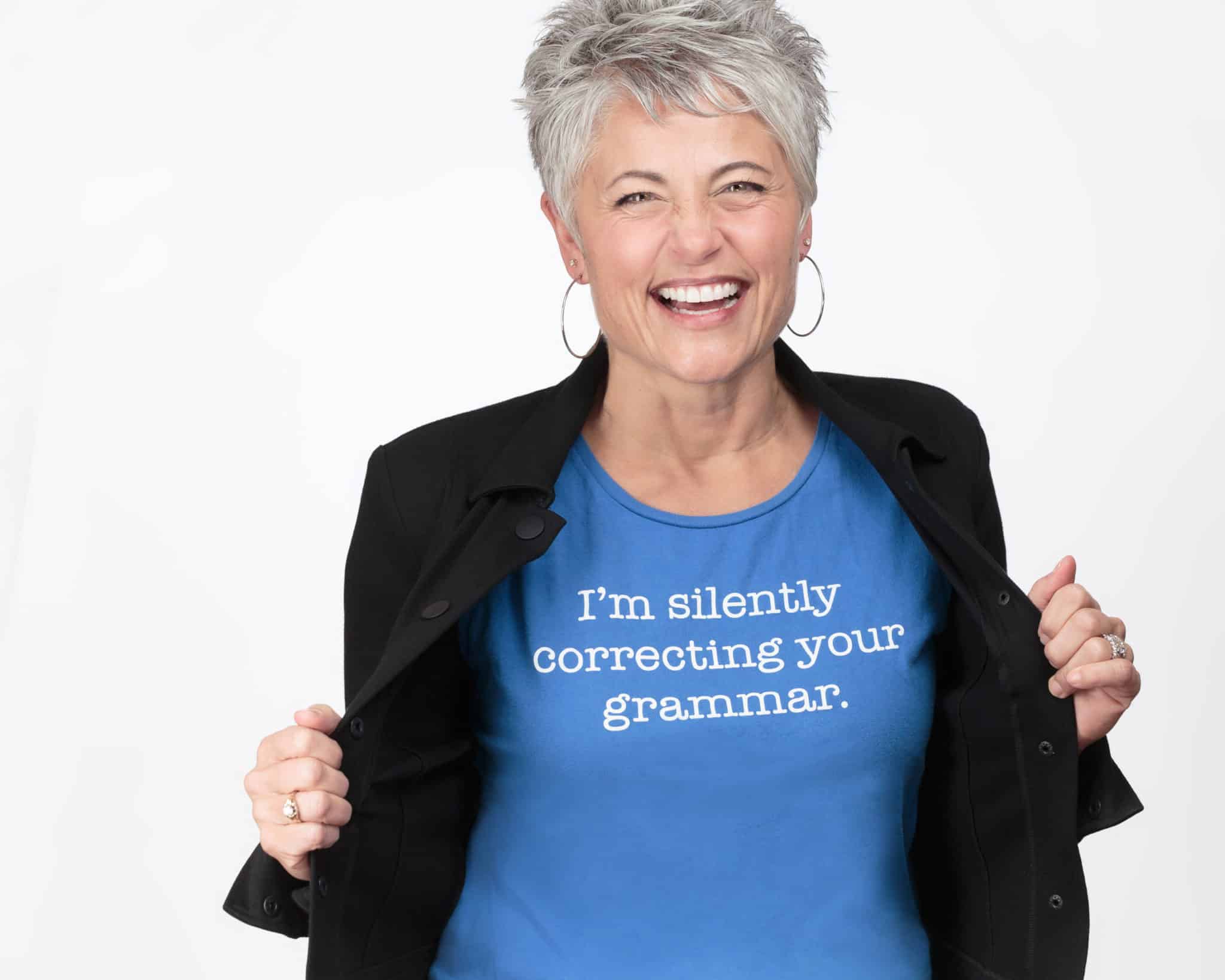
Communication can be complex. Learning to communicate effectively is important for maintaining strong and successful relationships in different areas of your life. Ever feel like your conversations end in frustration? Or that you avoid having confrontational conversations? Join us for this workshop where you will learn to minimize misunderstandings while also learning to speak with truth, respect, and confidence. By improving your ability to communicate, you will have conversations that will result in action and understanding.
This lecture is for anyone interested in improving their ability to speak intentionally. There are two dates available: Saturday, August 11, from 9 am to 12 pm. To register today, click here (https://recoverybp.org/seminar-series/)
Please check out Jenni’s website to learn more about this amazing woman and the work she does: (https://www.thewordspark.com)
-
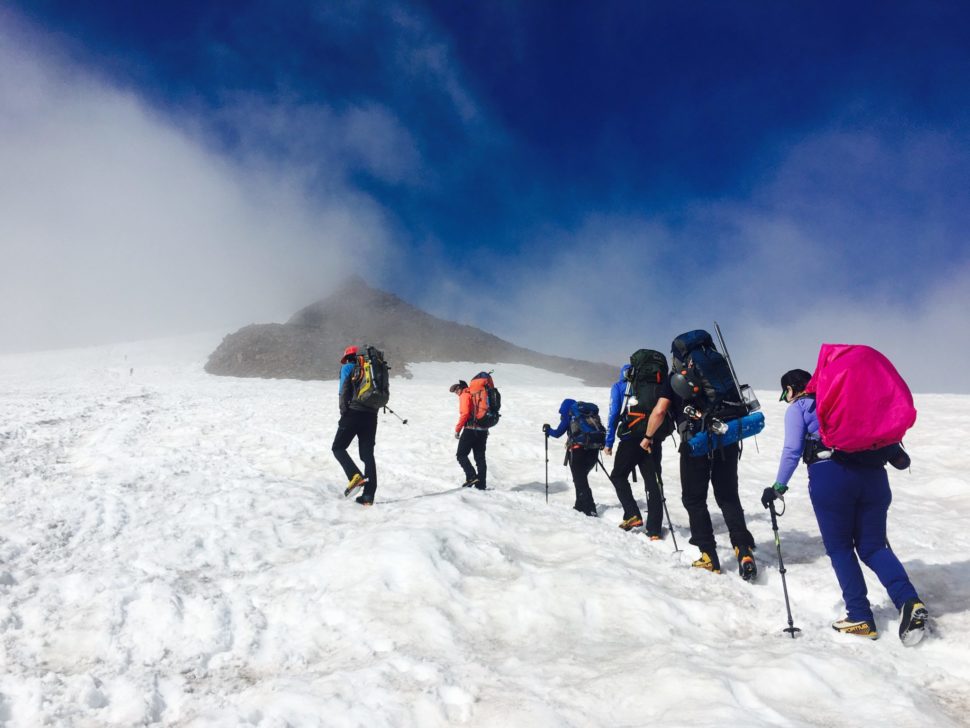
Meet The 2018 Climbers
Each person that goes through our program has a unique story. We wanted to take this opportunity to introduce you to each of our 2018 Climbers.
Meet Tyra

Tyra | Seattle Women
A Seattle native, 26-year-old Tyra found her way to Recovery Beyond after hitting rock bottom. “I was hopeless, and living in a car,” she said, “I was pregnant with my second child and fighting to get my oldest back.” Staying clean and sober with support from colleagues and staff at the program has opened up new doors for her, and she is optimistic about the continued opportunities she will experience in this program. “This is an amazing opportunity and staying clean will bring more opportunities like this my way.”
Meet Nicky

Nicki | Seattle Women
41-year-old Nicky hails from Sartell, Minnesota and has lofty goals for her life in and beyond the recovery program. “[I want] to climb Mt. Rainier, run Ragnar, Sparta, and a half marathon.” Besides these incredible physical feats, she wants to help remedy her relationship with her family and find peace within herself through the support network of Recovery Beyond and the strength of her own spirit. There is no doubt that her passion, faith, and desire for change will help her achieve these goals and more as she strives to become “more of who God designed me to be.”
Meet Michelle

Michelle | Seattle Women
Hope and acceptance are two of the most quintessential human desires – something we all search for in moments both big and small. Hope is also what drew Michelle, a Californian transplant, to the Recovery Beyond program. “[I have] a need to know that I am not useless and unloved. I hope to learn to not hate who I became, and to learn how to be happy and live life to the fullest,” she says. Staying sober with the support of the climb team and building a foundation of healthy friendships offers her that beacon of hope – of finding her own value and learning who she is in Christ.
Meet Sarah

Sarah | Tacoma Women
For Sarah, a native of Spanaway, motherhood was the best motivation to turn her life around. “I have these two beautiful children that I wasn’t being the best mom I can be to so I was willing to try anything,” she said of joining the Climbing Out climb team. 30-day-programs had failed her before, and she had to hit rock bottom before finding her way here. “[The Climb Team] is a commitment I’m sticking to!” she says, “It is a healthy replacement that gets me motivated to be strong and healthy.” Her goals outside of the climb itself include pursuing a career as a substance abuse counselor while exploring God’s truths and plans for her.
Meet Julie

Julie | Tacoma Women
30-year-old Julie from Parkland, WA takes a God-centered approach to her climb. She feels a closer relationship with God brought her into the program and will continue to guide her through the challenges and trials ahead while she builds relationships with others and grows to “be a light in the world.” When asked why she wanted to join the climb team, Julie replied, “Going through things you never thought you’d go through will only take you places you’d never thought you’d go,” an apt message about climbing mountains in both the physical and emotional world.
Meet Jessica

Jesica | Tacoma Women
Jessica of Puyallup believes that God brought her to the Climbing Out Program. “I needed to get clean and sober so I wouldn’t lose my children, so I wouldn’t lose my relationship with God, who loves me unconditionally even through my dark days. He brought me to the program.” Along with pushing herself physically for the climb, she hopes to maintain awareness and control over her addiction while rebuilding relationships with her family members. She is particularly excited about working together with the climb team, saying, “I get to be around other people going through similar things, and I get to step outside my comfort zone, and push my body in ways that it’s never been pushed. The climb team is a beautiful group of people there to encourage each other.”
Meet Colin

Colin | Seattle Men
Originally from Sacramento, CA, Colin believes the physical challenge of training for the climb and becoming physically fit will be a source of support in his recovery. He came to the program after growing tired of the life he was living, and hopes to get sober and make changes in his life.
Meet Chris

Chris | Seattle Men
At the age of 27, Seattle native Chris has already lived through more than many, including a stretch of homelessness and drug addiction that “nearly took my life,” he says, “After me realizing that 3 years had gone by and I had freely given away everything for that next high, I knew I needed a change and that change had to include God in my life.” He came to the Climbing Out program seeking a better relationship with God, a foundation in sobriety, and hoping to climb mountains and someday run marathons. He considers the fellowship of the program to be one of its major strengths. “Being a part of something bigger than yourself is a true blessing.”
Meet Joe

Joe | Seattle Men
Joe, a 28-year-old hailing from Longview, started using painkillers at a young age, which quickly turned to using heroin and nearly landed him on the streets. To avoid homelessness, a former counselor recommended he seek out the services of the mission, and the rest is history. He hopes to use the Climbing Out program to build a strong network of sober support, build a relationship with God, and mend his relationship with his family. “Through the climb team I’m able to meet many people in recovery, have spiritual experiences in nature, and instill discipline,” he says.
Meet Edward

Edward | Seattle Men
48-year-old Seattle native Edward hopes to use the recovery program to make significant changes in his life, ranging from strengthening his relationship with God to finding and securing housing and a job. His experience with the climb team is helping him learn teamwork and discipline. “The training is great experience,” he says.
Meet Christian

Christian | Seattle Men
Christian hails from Auburn, Washington, and is using the recovery program to dig at the roots of his addiction in hopes of creating lasting change. His goals include getting his depression under control, digging into how his thinking processes influenced his life circumstances, and learning more about religion and how it has and will impact his life. He looks forward to working with, learning from, and gaining inspiration from his teammates. Of the climb program itself, he says, “It is a healthy hobby that is fun and inspiring to go along with some of the more heavy psychological things I am working on. [It] gives me a feeling of accomplishment as I work on personal goals.” The intentionality with which Christian pursues his recovery are sure to serve him and his teammates well along the way.
Meet Tom

Tom | Seattle Men
Tom, a 27-year-old from Bothell, found his way to the Climbing Out program offered by Recovery Beyond after a scary wake-up call. “I relapsed and ended up in the ER with alcohol poisoning,” he said. He hopes that with the help and support of the CADRE program he will be able to maintain sobriety through the course of the program and beyond. Tom is looking forward to the climb, saying, “It gives me a fun goal to work towards, and a once in a lifetime experience.”
Meet Jason

Jason | Tacoma Men
22-year-old Jason was raised in Las Vegas and cites family as a major motivator for him in the recovery program. “My mother was struggling and trying to help me at the same time,” he says, “I’m not the uncle, brother or son that I want to be.” He struggled to find work due to his addiction, and hopes that with the recovery program he will be able to find a career to pursue and further his education. Jason’s compassion shines through when he speaks about hiking with the climb team. “I like to stay back with people who struggle a little bit because I believe it helps to have someone with you motivating them.” To him, the recovery program represents a change to continue to forge these meaningful connections with others and a new lease on life. “To me, I wasn’t present in my own life. I would be alone forever if I didn’t come here.”
Meet Chris

Chris | Tacoma Men
Chris is a Tacoma native who has hopes of someday pursuing a career in fire and rescue. With the help of the climb team and recovery program he hopes to boost his self-esteem, discover new coping mechanisms, and focus on tools to build better relationships with others.
Meet Stephen

Stephen | Tacoma Men
Stephen is a 40-year-old local who is working on centering himself and his life around God. He was brought to the program in hopes of bolstering his recovery from alcoholism and to become a better father and husband. He hopes the climb team will help him build better relationships with people by building trust and learning to work as a team to achieve goals.
Meet Jason

Jason | Tacoma Men
Born to a preacher in Burien, Jason credits his early success in life to his foundation in faith, one he hopes to return to through the recovery program. Of his life, he says, “Due to my imperfections and following temptations I became aware I had no more ability to manage success in a responsible way. I needed help, & by my faith, I think it brought the Mission to me.” By building his faith in the company of like-minded others on the team, he hopes to access a new level of spirituality. He sees the climb as both a physical and metaphorical opportunity to rise above. “I will literally have the opportunity of a lifetime, to experience in a physical and mental way, the epic goal & reward of reaching a mountain top!” he says, “My success depends on similar principles to my recovery.”
-
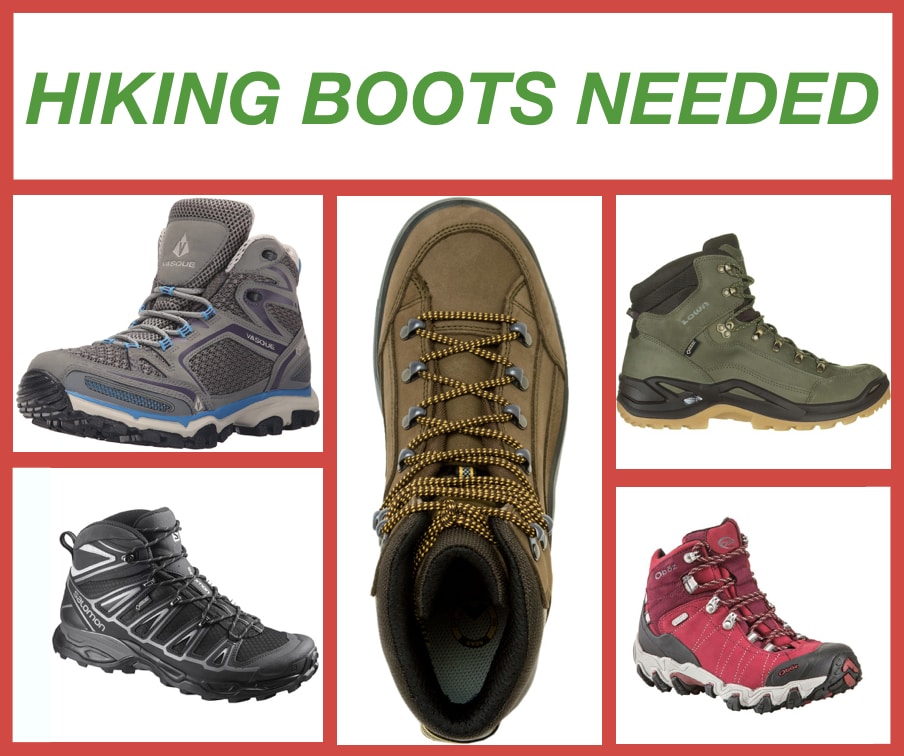
BOOTS NEEDED: Literally Support a Climber
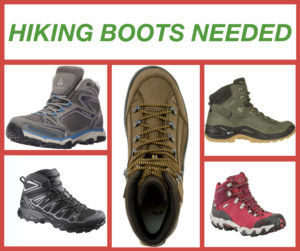
LITERALLY, SUPPORT our program climbers by providing boots…
Christmas is less than a week away!
You may be last minute shopping and running those last errands for your annual Christmas party; we are busy this week! When you’re out-and-about this week consider supporting our program in a practical way…
The most essential piece of gear for any physical activity often starts with the feet. Our feet are our base. We use our feet to walk, to shop, to run, to go get the mail, to meet a friend and for us, to climb. They are the “foundation” to our bodies framework (for most of us). When it comes to hiking and climbing, it starts with a good pair of boots!
Our program relies on donations and is in need of boots! Hiking boots and mountaineering boots; both!
Well supported, waterproof, hiking boots is what we are looking for. You can donate boots to us directly here (Donate Gear Here) or by visiting our REI “Climbing Out Wish List”. More specific details are provided there. (Climbing Out Wish List)
If you have questions, email us at info@recoverybp.org
No Boots? Other Items Needed at this time:
-Micro-Spikes
-Gaiters
-Hiking Pants
-Rain Pants
-Base Layers
Visit Here for more specifics: REI Wish List
-
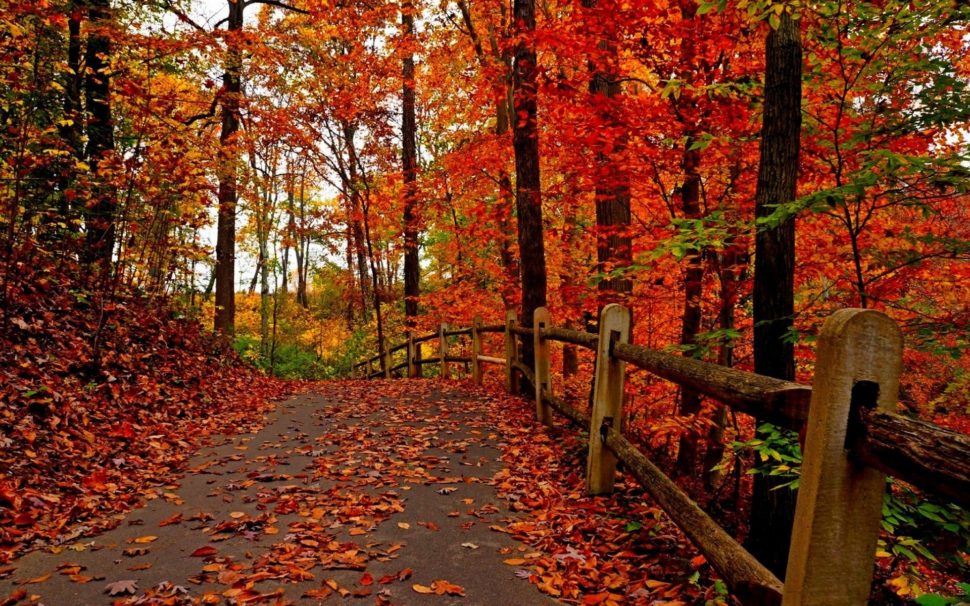
Make An Impact This #GivingTuesday
Helen Keller said – “Alone we can do so little; together we can do so much”
We do have so much to be grateful for. #Giving Tuesday is a follow-up to the mass purchasing behavior we exhibit on Black Friday and Cyber Monday. Its purpose is to focus our attention on deserving non-profits who do so much to help our community; more than we know or can calculate. It’s a two-way street, we support them and they provide an outlet for issues we are passionate about, but may not have the time to get actively involved with. Regardless of your reasons, supporting these groups provides for needs that otherwise would go unmet. People depend on non-profits to fill the gap left where social services offered by our government agencies leave off. These same non-profits depend on public donations to keep their doors open and welcome those in dire straits.
This year we are proud to be part of that group of non-profits providing a lifeline to those trying to escape the pull of addiction; people who don’t have anywhere else to turn. Like other non-profits, we can’t survive without the generosity of people of good will. People who know that by becoming a more caring community we can do tremendous things.
Why is giving a good thing? The heart is a muscle that needs to be exercised to be healthy and working up to capacity. Our ability to give is one measure of how well our heart (and conscious) is working. There have been many studies touting the benefits of giving and volunteering time; apart from the physical and emotional benefits, the connections we make are very rewarding for those we serve. These social connections are very good for us, too. They keep us engaged and learning; while providing support for others, they help us gain or strengthen skills. During the holiday season, it’s good to assess where we are giving and where we could be giving more of our treasure or our time. It is ‘with and through community’ that we can make the largest impact; where we can share the wisdom we have gained and offer consolation for those who are working to regain control of their lives.
Please consider the many ways you can become part of our Community of Compassion. Compassion is defined as sympathetic consciousness of others’ distress together with a desire to alleviate it. Recovery Beyond’s goal through our Community of Compassion members is to make homelessness due to alcohol or drug addiction a thing of the past. We assist with a therapeutic approach to sustained recovery and reentry into society during our 10-month program. Please find joy in giving to the non-profits of your choice. Our Climbing Out Program is one place that will make good use of your donations.
Learn more about what we do at Recoverybp.org to get involved or to get help.
Winston Churchill once said, “We make a living by what we get. We make a life by what we give.”
-
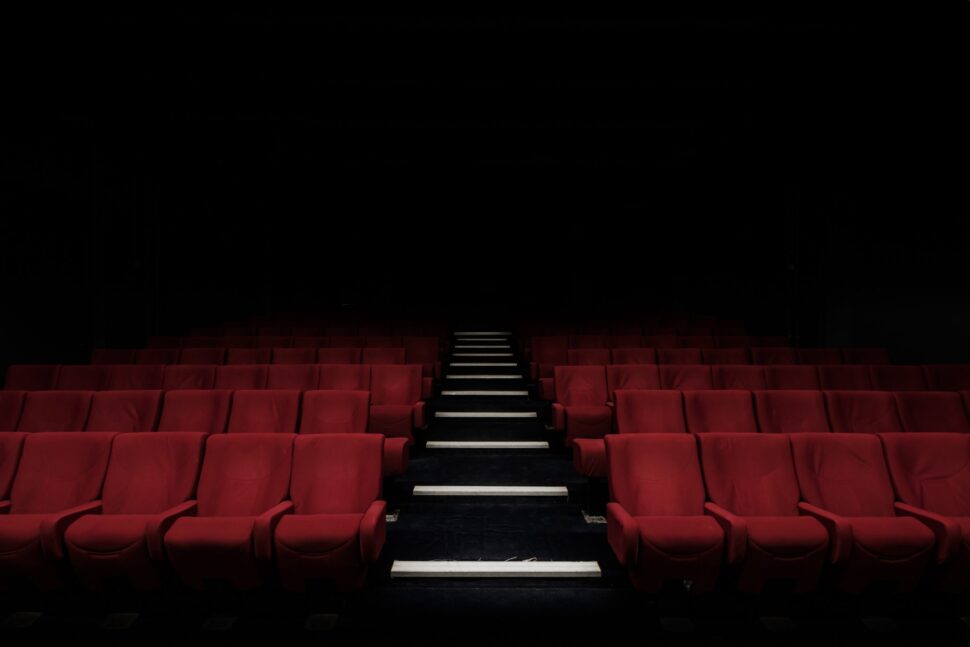
Our First Movie Night
Our first movie night was held on September 17th at Mary, Queen of Peace Church in Sammamish, Washington. This event kicks off our fundraising cycle for the next program year which begins in October.
We had the opportunity to tell the Climbing Out story to people who were very interested in helping those struggling with permanent housing and the reasons for it. Addictions of all types drag people down. Addiction destroys self-esteem, relationships and families, and causes a host of physical, emotional and mental problems. The Climbing Out program offered by Recovery Beyond offers a holistic approach to the needs of each individual. This approach addresses the priorities in the next stage of treatment and recovery. Working with our partner missions, we can accomplish more in the year or two when we join together in working with clients.
Our volunteers and mentors walk the journey with our clients as friends and a source of wisdom, experience, and support. These relationships are a very significant part of achieving long-lasting results. We can’t thank our volunteers enough for the love and care they provide.
While we are still developing a full set of metrics to track progress and overall success, we know that the Climbing Out program works because our clients are the proof. Not only do they complete their treatment program, but many come back joining next year’s program as a volunteer and mentor; supporting others through the perilous journey to sobriety. This Community of Compassion is what you join when you support us with your ongoing gift of time, treasure or equipment.
Some of the program participants attended this event; sharing their story and the impact the program had in their lives. We hope that this message of hope shared through personal stories in the film will foster increased giving offering grow the programs Recovery Beyond sponsors.
Make A Donation Today! -

Mountains help us out…
“In every walk with nature one receives far more than he seeks” ~ John Muir
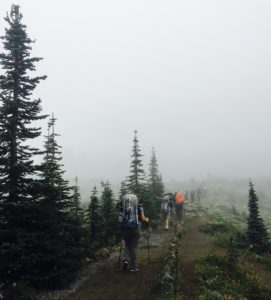
Ascent Up Mt. Rainier
This year was different than most climbing years. It presented new challenges and more “failure” than I expected or knew how to handle.
How will I respond to failure? How will I choose to tell the story?
There’s this mantra out there, maybe it’s on a bumper sticker somewhere or maybe it’s called the American Dream, that if you work hard enough you will get what you want. When I was a kid I remember my parents telling me I can become whatever I want to be, as long as I put my mind to it. I think I asked my mom if I could work at Disneyland when I grow up. I’ve obviously missed my calling. But that’s how life works right? You can get what you want by the power of your will.
Or is it?
Mountains help us out.
I appreciate that about mountains. They are realistic. They don’t apologize. They don’t care about my feelings. They are indifferent to my life goals or my 7-step plan. Sometimes a mountain lets you climb, and other times it doesn’t. Somehow being at the mercy of a mountain sets my perspective just right.
Reality … check.
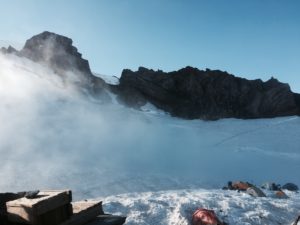
Camp Muir, Mt. Rainier
If you take a look back at an earlier blog post from this year, you’ll read a story about a serious mountain “gut-check”. Back in May we went after Mount Hood and we pretty much failed. It was tough. The mountain was not kind. We weren’t prepared and we got whipped, with about half of the team turning around early. Our team felt scattered and could have fallen apart. It was hard. But it became both a teacher and a motivator.
We trained harder, we got faster, stronger, and more connected as a team. “This time we will be ready!” Some climbed extra mountains to prepare. Diets became more strict. Technical training increased. Mount Rainier was in our sites and we were going to get it this time. This time will be different.
Mountains help us out.
Mount Rainier said no. Mic drop. At 13,500 ft, a snow-plug the size of a football field fell through making the route impassable. The mountain decided it wasn’t going to let us climb. No one climbed to the summit for three or four days, us included.
Reality… check.
We say this phrase a lot, I’m sure you’ve heard something similar a time or two…“life is about the journey and not the summit”. WHAT. Get out of here. I want the summit! I’ll be honest with you, I want to get to the summit and then get the heck off the mountain. Another notch on my belt. (Maybe I should work at Disneyland; where dreams do come true.)
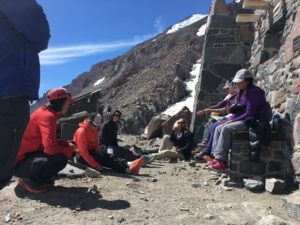
Team Debrief of the Rainier Climb
This year the metaphorical mountains we had to cross and trek over as a team were more technical and demanding than years in the past. This required more out of us every step of the way. More teamwork, more communication, more strategy, more change of plans, more love, more humility, more of us in every way. In the moment it sucked, but looking back, I wouldn’t want it any other way. This journey made us a team, and made each of us better women and men because of it. This team became accustomed to the value and worth of the team itself. In the end that’s what life’s all about anyway, who you take along on these messy, beautiful, life-adventures. This is the kind of life I want to live; living in the tension of the journey, with the risk of failure or success up in the air, doing it alongside those I love. These are the kind of stories I want to tell. The epic tales of a team.
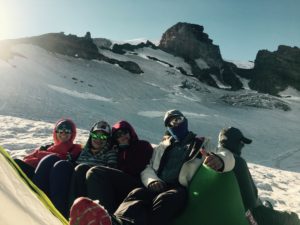
Lounging on the newest mountain accessory. The inflatable couch.
I think it was best said by Matthew and Uncle Mark the evening before we set foot up the mountain back in August. Below, read what Matthew had learned. He nailed it; Relationship, failures included.
Sometimes we need failure like we need air. Sometimes a change of perspective isn’t what we planned on, but exactly what we need; reminding us about how to be human again and drawing us back together.
Mountains, help us out.
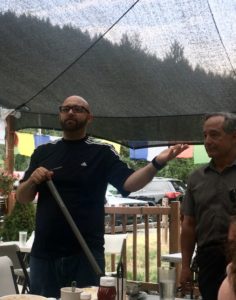
Matthew and Mark share their reflections
“I went from having no relationships, to having so many people surrounding me that love me. It’s really been those relationships that have gotten me to this point. If it wasn’t for my team and leaders, I would have never grown physically or spiritually as I have.
Im at the point now where I know that it’s not just about summiting; whether I made it or not. This (points at people around the table) is the victory that I have been seeking and searching for. Obviously that (the summit) is something I have been working for and is something I want, but it’s been the relationships that are the most important thing in life I’ve realized. You all are going to be here after Mount Rainier is over. So thank you.”
~ Matthew Arthur, 2017 Climber
“THIS IS THE PROGRAM. What we have here as a team, who you are now sitting at this table, that’s who you are, that’s what you’ve gotten from this program”
~ Mark Ursino, RBP President
-
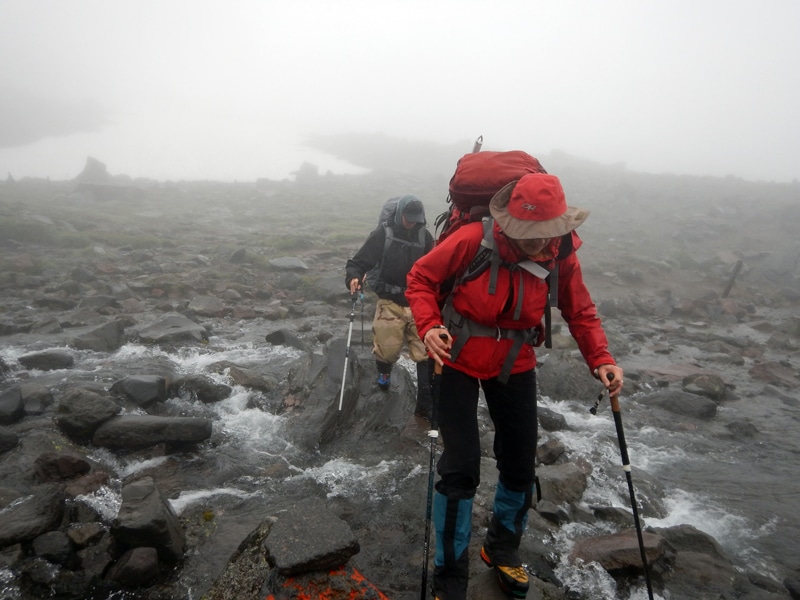
There’s A Reason It’s Called “Climbing” And Not “Summiting”
For the first time in the 7 years we’ve run the Climbing Out Of Homelessness Program, Mt. Rainier got stingy and denied us (and everyone else climbing that night) the summit.
We met in Ashford on Saturday, August 12th for final gear check, and to get whatever gear the team lacked, courtesy of Rainier Mountaineering, who has opened their rental counter to us at no charge since the beginning.
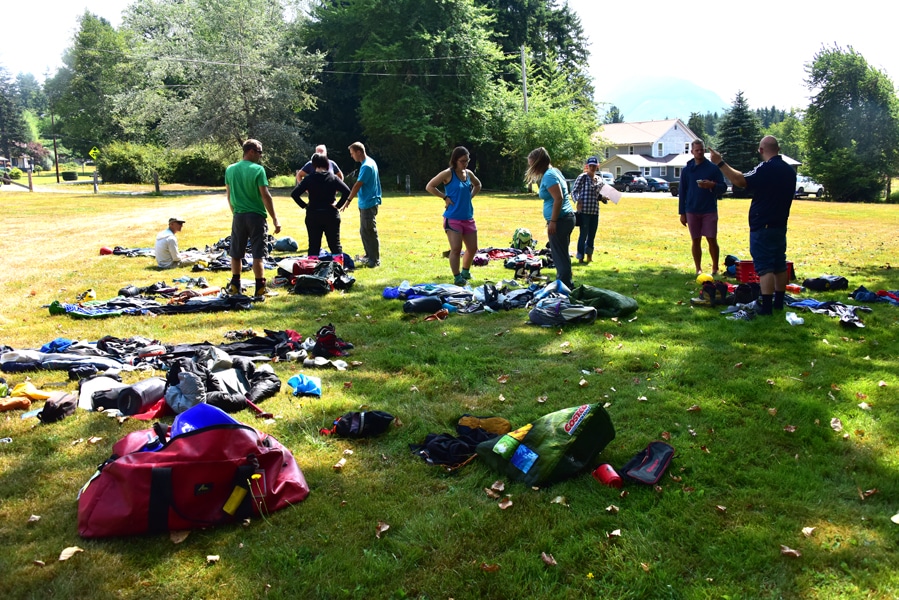
Gear Check Before Climb
At our annual pre-climb dinner at the Wild Berry Restaurant in Ashford, we caught wind of a huge collapse on the upper mountain on Rainier. We didn’t know what to make of it, but it didn’t sound good. The more we heard, the worse it sounded. It didn’t dampen our festival mood at the dinner, though, and we had our usual presentation of engraved ice axes to our Program Climbers.
We also had our annual “Sundae” and “Cherry” conversation. That is to say, the climbers have already had the sundae – the program and sense of team and accomplishment getting through the training, climbing Mt. Hood, spending the night on Mt. Rainier during our final climb simulation – this is your 3 scoops of ice cream. The summit is the much desired cherry on top, but whether they get that final reward or not, they’ve gotten the sundae.
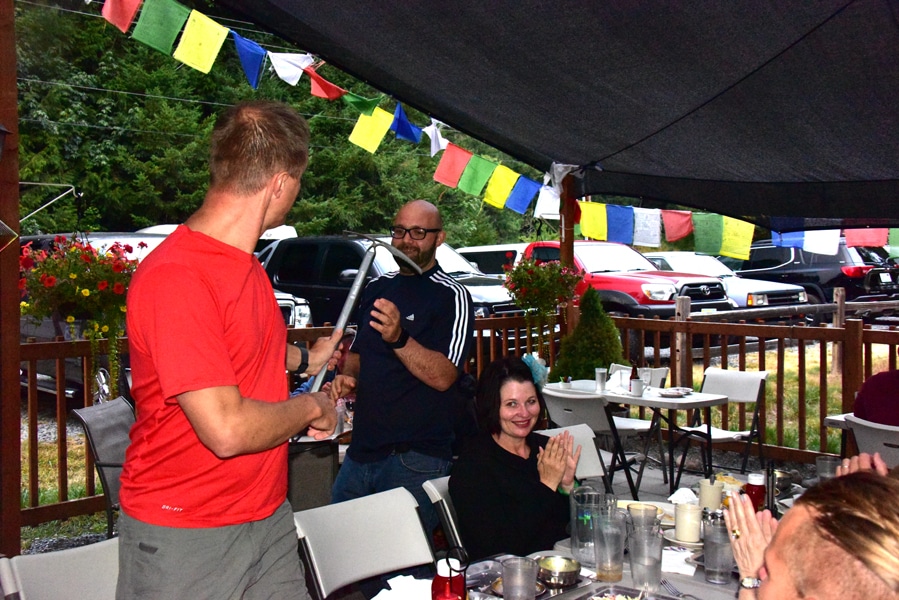
Mike presents an axe to Matthew at the pre-climb dinner.
We woke on Sunday to a persistent mist and a very soggy mountain.
Camp Muir was just at the top of the clouds, though, so we were dry, and pretty much in the clear as we set up camp.
I met with Jason, one of our volunteer guides, and the person responsible for coordinating the efforts of the 3 guide services who are licensed to guide the Disappointment Cleaver route on Mt. Rainier, as well as commissioned with maintenance of the route. He told me that they had no idea if or when they might find a route past the trouble to the summit. He also let me know that he and Phil (another of our volunteer guides) would most likely be tied up working on the route, and wouldn’t be able to help us with the climb. I told him that I’d already figured that would be the case, and was working out contingency plans – none of which could result in all of us making a summit attempt.
We had dinner, and went to bed, knowing only that in the morning, the team would be going through another round of “Basic Snow School”, this time with Leon (our climb leader for the past several years) and Lindsay (who has been a key volunteer guide since 2013 as well).
Monday morning, the team got up, breakfasted, and hit the snowfield for their training with Leon and Lindsay. Meanwhile, when asking Jason about the situation on the mountain, he said that it could be summed up in two words, “Totally @#${637c4c527fde39f83a380e19107d2ba88ad72607f37ccf8f8b7edeff1c20688c}ed”.
“Meanwhile, when asking Jason about the situation on the mountain, he said that it could be summed up in two words, ‘Totally @#${637c4c527fde39f83a380e19107d2ba88ad72607f37ccf8f8b7edeff1c20688c}ed’.”
Since it didn’t look like there was going to be a route to the summit, Leon and Lindsay came up with a plan to take the team to Ingraham Flats (the first stop up from Camp Muir) the next morning as a way to allow them to experience and see more of the mountain, and perhaps lowering them into a crevasse just for giggles. It’s actually a pretty cool experience.
The team was disappointed at not getting a shot at the summit, some VERY disappointed, even though they had been prepared for the possibility. But the mountain rules.
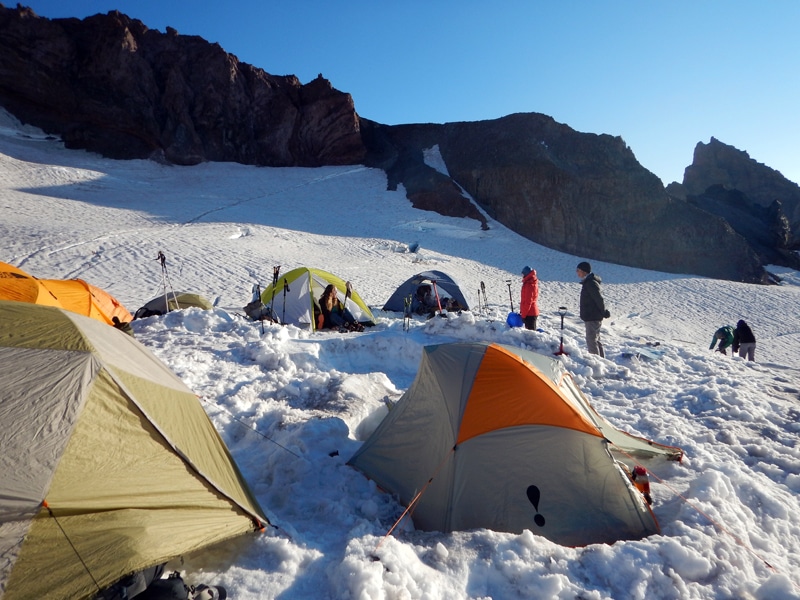
Our Camp At Muir
Just before the team went to bed, we received word that two professional guides had made it to the summit. That didn’t mean that there was a route that your average climber (much less a pack of newbies) could climb successfully, but it did mean there was some kind of a shot – maybe. So the team went to bed knowing there was a SMALL chance they might get awakened at 11 pm to climb, but most likely they’d get woken up later in the morning to climb to the Flats.
After the team went to bed, more guides headed up the mountain to try to at least heavily mark the route. Leon told us to keep our radios on, and he and Lindsay would make the call on the climb “later.”
Just before 11 pm, we got the call from Leon that he didn’t have any news from higher on the mountain, but he thought the Program Team should give it a shot. We rousted the climbers, had breakfast, got everyone geared up, and sent them out.
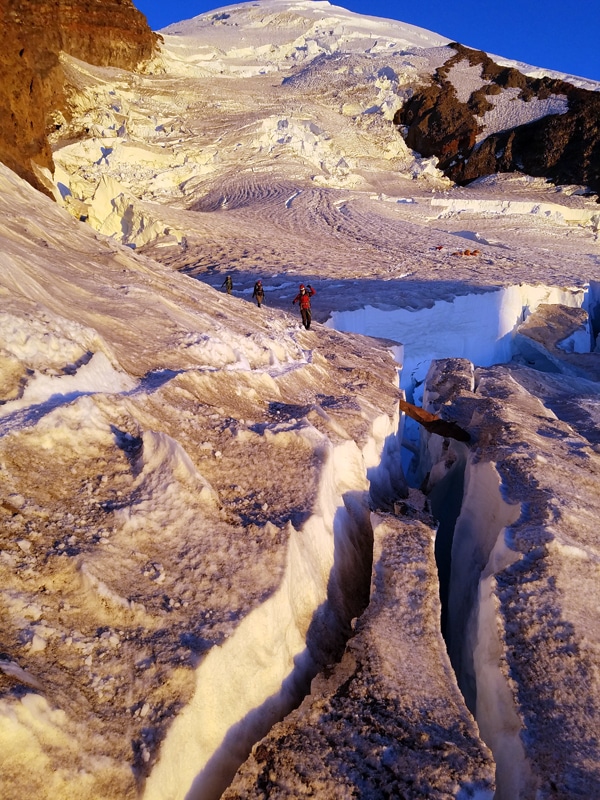
The climb team on Ingraham Glacier.
Even before the snow plug collapse, the route had been unusually long, hitting the summit in a spot no one (even long-time mountain guides) ever remembered it going. After the collapse, it was not only long, but hit a spot of mountain that was deeply sun-cupped into formations that are called “penitents” because the formations kind of look like people on their knees in prayer – thousands and thousands of people. They are very difficult to traverse, because there is no flat footing (at any angle), and you climb over and through the sun cups. There is no efficient way to climb, and the going is VERY slow.
The RMI guided group ahead of our group turned around just above 13,000’. Our team followed suit. The final push to the summit was going to take more than 2 hours, and being already over 5 hours into the climb, there was concern about people having the ‘gas’ to get down safely. Remember, the goal isn’t to get to the top, it’s to get back to the bottom – via the top if possible, but the top is optional, the bottom is not.
Everyone came off of the climb MUCH happier that they at least had taken a shot at the summit, and having gone through what they’d gone through, and seeing what they saw, knew that they had given it their best shot, and the mountain just wasn’t giving it up. No one summited that night, and I don’t believe anyone summited the next night either.
“Many of us throughout life need lessons in how to deal with disappointment constructively. And I think this team did.”
Not reaching the summit was disappointing for all of us, but the climb was a success. In some ways, maybe even a bigger success for NOT having summited. Many of us throughout life need lessons in how to deal with disappointment constructively. And I think this team did.
-
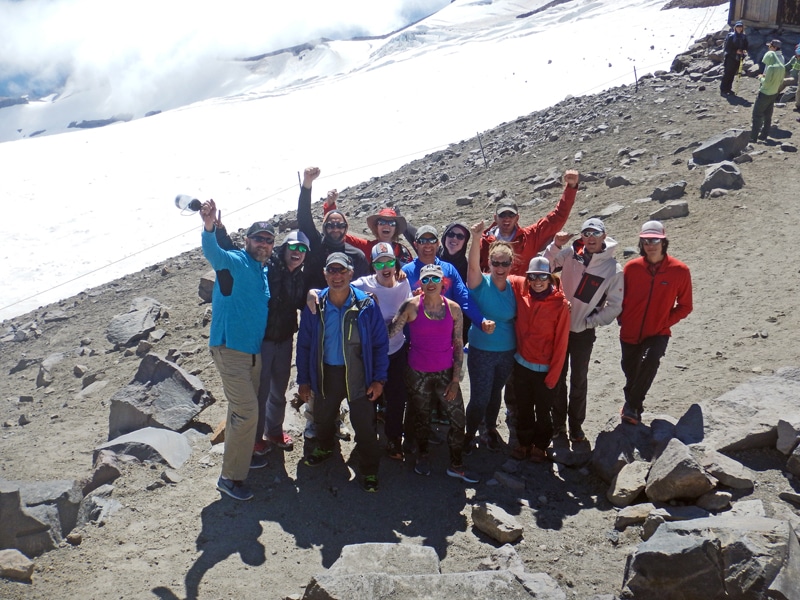
Our Relationships Are Our Summit
After our first year, we interviewed our recovery climbers. Every one of them said that the team experience was more meaningful to them than the summit itself. So we re-focused the program to emphasize team building and healthy relationships. We added community climbers alongside those climbing out of homelessness.
This year was the first year we had no effective route to the summit, and the emphasis on team-building paid huge dividends. We may not have been able to reach the mountain’s highest point, but the relationships were a true “high point” for all involved…and more enduring!
Life really is about relationships, and so is climbing. Our senior guide and friend Leon Davis was asked by one of our recovery climbers which mountain was his favorite to climb. He said, “I don’t think I have a favorite mountain, but I have had some favorite outings. Those really were about who I was with.” That’s what we got this year, Leon: and it really is the true summit.
Program Spotlights
Recovery Beyond > Program Spotlights
